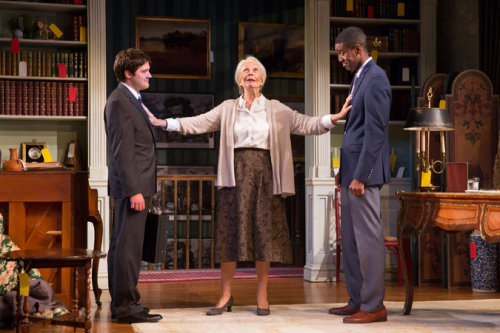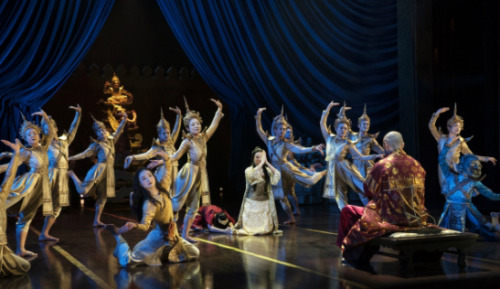
What a curse wealth is. Though vast numbers across the globe would welcome the chance to see what it’s like to be thus cursed, Cornelia Cunningham, the dowager WASP at the heart of A.R. Gurney’s new Love & Money is decidedly of the opinion that too much of the latter prevents one from having enough of the former. Which is why, when lights go up in Signature Theatre Company’s Griffin Theater, Cornelia is writing large checks to a variety of charities. She is interrupted in this by the arrival of a young estates and trusts lawyer who has come to inform her that the extremely philanthropic nature of her will leaves it open to challenge.
Cornelia is having none of this. Her grandchildren will get enough that they never have to worry about having a roof over their heads, but not so much that they will be tempted to buy Ferraris and private islands. She’s also giving away pretty much everything in her large New York apartment, including a leather-bound edition of the complete works of Dickens and a player piano that has been modified to play the full Cole Porter songbook.
As Cornelia and her lawyer argue, they are interrupted/joined by other characters: Agnes, Cornelia’s maid/cook/major domo/best friend; Jessica, a Julliard student who has come to claim the donation of the player piano, and Walker “Scott” Williams, a young man of African-American descent who claims to be the son of Cornelia’s long-deceased daughter.
This all probably sounds more complex than it is, for Love & Money is actually quite a frothy, light entertainment, perfect for a Sunday matinee with the ladies. There’s nothing to offend here, but nothing to inspire, either. The actor’s performances are all well-crafted (with the exception of Gabriel Brown as the young claimant to the estate, who unfortunately overdoes his impersonation of Will Smith in Six Degrees of Separation), and the script bounces along over the course of 90 minutes, but there’s nothing here to really bite into. Like a palate-cleansing sorbet, it melts away in moments.

Lincoln Center is, to my mind, the closest thing we have to a national theater in the US. It is not directly supported by the government (at least not to the extent that other national theaters are), nor does it boast any official imprimatur. But given the scale of theatrical production they are capable of, especially in the Vivian Beaumont, and the fact that they operate as a non-profit, I can think of no better organization to bear the standard of a “national” theater. Because of this, I come to the Lincoln Center Theater with certain expectations. Generally, that their productions will be either classics (South Pacific, Macbeth, Anything Goes) or important contemporary works (Stoppard’s The Coast of Utopia, War Horse, Six Degrees of Separation), which will be produced with excellence and presented on a grand scale.
The new production of Rodgers and Hammerstein’s The King and I lives up to these high standards, yet it still somehow disappointing.
But let’s begin with the positives. First and foremost, Kelli O’Hara. From the second she appears on stage – arriving in Bangkok on a giant steamship that sails on stage in a magnificent curtain up moment – she feels like she belongs. Only a few stars have the presence and the power to blend so seamlessly in the enormous, expansive environment that is the Vivian Beaumont, and O’Hara is one of them. She could make this stage her home for the next 20 years and it wouldn’t disappoint me in the slightest.
Once she begins to sing, she cements her position as a star of the first order even more completely. Her voice is lovely, delicate but powerful, hitting all the high notes – but with a round, full tone that keeps them from becoming the high-pitched shriek that bedevils so many sopranos. The Tony she won for this role (her first) is well-deserved. She sings and acts the role of Anna Leonowens with near perfection.
It’s also impossible to fault the design team for The King and I. The environment they have created is nothing short of magnificent. From the steamer that delivers Anna to Siam to the opulent and impressive throne room to the garden scenes with dripping vines, all is massive, impressive and gorgeous to behold. The costumes (for a cast of about 50) are also arresting and elegant.
The blame can’t be placed on any of the actors, either. Jose Llana is forceful and imperious, commanding the stage as a king should. Even though he fails to successfully land some of his funnier lines (“Is a puzzlement!” never seems to deliver the impact it should), he’s still terrific. Ruthie Ann Miles, as Lady Thiang, first wife to the king, proves why Tony voters tapped her this year.
The orchestra, likewise, is magnificent, and the ballet of “The Small House of Uncle Thomas” is brilliantly choreographed and staged by choreographer Christopher Gattelli and director Bartlett Sher.
So what happened? Why didn’t this production woo me in the same way Lincoln Center’s 2008 production of South Pacificdid? First, I suppose I set an incredibly high bar, as that South Pacific was one of the finest things I’ve ever seen on stage anywhere, and I’m of belief that its book and score combine to make it the greatest of all American musicals. The King and I, despite featuring some of Rodgers and Hammerstein’s most memorable songs (“Getting to Know You,” “Whistle a Happy Tune” and “Shall We Dance”), there’s a certain Disney-esque quality to them that feels slightly forced, especially in the context of the show. The darker elements of this The King and I, while certainly not ignored, failed to stand out against all the gorgeousness and light of the rest of the production.
Despite this disappointment, I still highly recommend this production. Because Kelli O’Hara. Also, when Lincoln Center puts its not-inconsiderable weight behind a show of this scale, it’s almost impossible not to be transported and impressed. They simply accomplish things no other theater organization can.

No comments:
Post a Comment